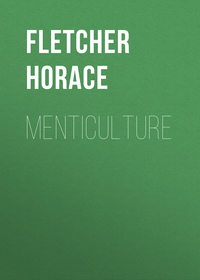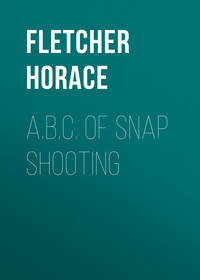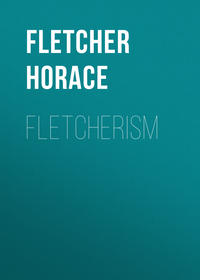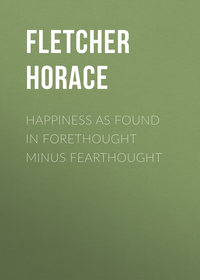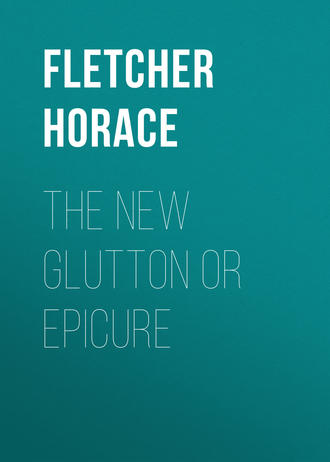 полная версия
полная версияThe New Glutton or Epicure
At first, rules have to be followed in order to serve Economic Nutrition to the best advantage, but they soon become habits of life, or living, that will naturally come of themselves from attention to Taste according to these directions.
It has been our experience, that if there are any diseases growing out of overstraining of the lower intestines, kidneys, liver, etc., they will soon disappear.
Perfect nutrition does away with the waste until there will be no invitation to discharge oftener than once in four or five days, when the response will be easy and final, with less than half the quantity of an ordinary daily contribution.
There are wealth, health, strength, long life, abundant usefulness and much resultant happiness offered as a reward for learning and following Nature's Perfect Way.
When we learn that obeying Nature's Laws emancipates us from the slavery to cravings of unnatural appetite, releases us from constant attention on meals, does away with at least half the drudgery of woman's work and makes us immune from the attacks of microbes of disease, it is then no hardship to take a few lessons in the Art of Economic Nutrition.
Every artificial method that has been suggested to coax Nature into changing her problems to suit man's poor interpretation has failed, but Nature has been patient withal. Her door to reform is never closed, and her patience is boundless towards prodigal and foolish children.
Nature has put the keenest of the senses at the threshold of life to serve both as hosts and servants, but Appreciation has heretofore failed to recognise their true office, while Ignorance, blinded by Greed, has spurned and abused the best of servants.16
SOME PERTINENT QUERIES
If Nature has revealed a perfect way to the easy solution of all of her problems, as related to the affairs of animals and plant life, WHAT SENSE is there in thinking that she has discriminated against her Chief Assistant in Cultivation, Man?
If Nature has provided animals with keen discrimination in the matter of healthful food, WHAT SENSE is there in doubting her good intentions toward the highest form of animal in this regard?
If Taste is the sentinel of the stomach and also the purveyor and inspector of nutrition, WHAT SENSE is there in ascribing to it the lowest place in the list of the senses?
If we enjoy eating, and are eating, partly, for the pleasure of it, WHAT SENSE is there in throwing away a morsel until the taste has been extracted?
If "dirt" is "matter out of place," which is the accepted definition, WHAT SENSE is there in calling unnutritious food by any other name?
If taste is the evidence of nutrition, and ceases to act upon dirt, WHAT SENSE is there in hurrying food past the sentry-box of Taste without giving the inspector time to select the nutrition and reject the dirt?
If the last flash of taste in dealing with a morsel of food is the best of all, WHAT SENSE in believing that Nature did not furnish that allurement for the wise purpose of inducing mastication to the end of taste?
If saliva is the medium of Taste, without which there is no expression of taste, WHAT SENSE is there in thinking that it is nothing but a lubricant, to enable food to be easily swallowed?
WHAT SENSE is there in slighting nutrition in the beginning when we know that the derangement of the process will continue throughout all the involuntary stages within the digestive organs, inviting disease and causing suffering?
THERE IS SENSE in carefully attending to the voluntary preparation of the food for the stomach, so that the involuntary functions of digestion and of assimilation may be performed with natural ease and freedom, thereby defying and preventing disease!
If we can save two-thirds of present consumption and yet furnish all that is necessary for perfect nutrition, WHAT SENSE is there in wearing out our Mind-Power Plant with a glut of surplus?
Unless a person has a pressing engagement with his own funeral, WHAT SENSE is there in hurrying with his meals?
If we can devote ten thousand actions of the jaw, daily, to senseless or vicious gossip, WHAT SENSE is there in denying adequate jaw service to the most important function of living?
WHAT SENSE is there in a rich person glutting his Mind-Power Plant with more food-fuel than it needs, just because he happens to have an abundance to glut with, or glut on?
WHAT SENSE is there in calling any glutton "a gentleman"?
WHAT SENSE is there in calling any glutton "a lady"?
If what Taste rejects, after having selected nutriment out of a morsel of food is dirt, WHAT SENSE is there in allowing it to contaminate and burden the delicate organs of digestion?
An indigestible morsel of food is like a runaway team in a crowded street. WHAT SENSE is there, then, in demoralising things in the thoroughfare of our life organism by admitting unruly substance?
An indigestible morsel of food in the stomach, and all the way through the intestines, is like a "bull in a china shop." WHAT SENSE is there, then, in smashing the delicate utensils in the laboratory of our Mind-Power Plant by rushing "bulls" past Sentinel Taste?
A SCIENTIFIC POINTPhysiological Chemistry declares that an important function of saliva is turning the starch of foods into dextrose – sugar – which is one of the high forms of nutrition.
An eminent physiological chemist, who is a friend of the author, and who has been experimenting with the suggestions offered by the discovery of new uses for Taste in securing perfect economic nutrition, says that the inexpressibly sweet flavour which comes with the last expression of Taste in connection with a morsel of food, especially dry breads, which are largely starch, is evidence of perfect conversion of the starch to sugar by the action of the saliva.
The sweet taste spoken of begins to be apparent in dry French bread after about twenty movements of the mouth, and increases until the whole morsel is dissolved and disappears into the stomach, leaving behind it a most delicious after-flavour. According to the quantity in the mouthful this process will take from fifty to one hundred movements of the mouth and require from half a minute to one minute.
In this connection remember, please, that if you bolt a whole slice, or a whole loaf of bread in the meantime, as soon as it is wet enough to swallow, you will get little, if any, more nutriment out of it, and none of the exquisite taste that Nature's way offers as an allurement for obeying her beneficent demands. The way of Nature is the epicurean way; the other way is nothing less than piggish gluttony.
Even if time for eating is limited, nothing is gained by bolting food. Thirty mouthfuls of bread thoroughly dissolved in the mouth will supply nutriment for a strong man for twenty-four hours, and the eating of it in the way recommended will give pleasure unknown in hurry.
My physiological chemist friend assures me that I am right in asserting that man should not drink anything but pure water, and that for the purpose of quenching thirst. If anything is good enough to drink at all it is too good to waste on an unwilling stomach when grateful and hungry taste-buds are eager for it.
Don't drink soup! Don't drink milk! Don't drink beer! Don't drink wine! Don't drink syruped sodas for the taste of the syrups! Sip everything that has taste so that Taste can inspect it and get the good out of it for you!
TASTE'S APPEALWater has no taste, therefore, Taste does not call it to a halt, but says, "Go right on and do your work, there is nothing in you that I can improve; thank you for giving me a freshening up in passing. If people only knew what you and I know they would be wiser, wouldn't they? They would learn a thing or two about keeping their Mind-Power Plant in fine order and get rid of all their physical ailments, and be strong and happy, and live to be a hundred and fifty years of age with their faculties unimpaired. I say! you are on the outside and can give people a hint; why don't you tell them what I am here for! They set me down for a 'capper,' like one of those fellows that stand outside of cheap restaurants and invite passers to come in and eat. They don't know I am an expert in nutriment and can protect them from any harm in eating. I offer them also a first-class bonbon taste, at the finish of my work to induce them to stay by and help me to do proper work, but they are all in such a blamed hurry that they never wait for the bonbon, and the result is that loads of dirt and indigestible stuff get by me and make endless mischief in the machine. I hear about it often enough you may be sure. All the sewer gas the indigestion produces comes back this way, spoils my comfort, and dulls my strength. You see, you can have a chance, perhaps, to learn for yourself and tell the people what I can do for them. I'm lodged in here in the dark where they can't see me and I have no means of informing them.
"I wonder why it is that Mother Nature makes such a mystery of her blessings. She never advertises and never exhibits her best things plainly. All her precious metals are hidden away in narrow seams in the ground; her pearls are guarded by close-mouthed oysters at the bottom of the ocean; electricity is as slippery as an eel and absolutely invisible; in fact, Nature is the most retiring, in her habits, of all the expressions of Deity; and, consistent with herself, she has put me in here, in the dark and speechless, provided with powers of selection and discrimination, which, if understood and made thorough use of, will do for man all that he can desire.
"The funny part of it is that the animals, other than man, use me instinctively and live their appointed time; while man, in his usual big-headed way, centuries and centuries ago, gave me the lowest place among the Senses, classed my chief agent and assistant, Saliva, as merely a 'pusher' of food into the stomach, and ever since he has been in too much of a hurry to live quick to take the time to live long; and that's what's the matter with the world."17
IMPORTANT CONFIRMATION
COMMANDANTE CESARE AGNELLICommandante Cesare Agnelli, of His Italian Majesty's battleship, "Garibaldi," has been an earnest colleague of the authors in the Nutrition Study since the summer of 1900. Like the authors, he received in the course of experimentation such personal benefits that the continued observations have been a source of great pleasure ever since. I take from a letter, dated Taranto, Italy, some excerpts that are good evidence of the caprice of appetite under different climatic conditions together with some irrelevant matter, quoted for its good reading: —
"What a good, long, friendly letter! If it was your intention to spoil me, it certainly proved a success; and I feel so much obliged and thank you so much for the interesting description of all you saw and did during your absence from Venice this summer.
"You are too good in remembering the few words of encouragement I said to you when you first spoke to me about your experiments. The fact is that I have always regretted that my assistance in the experiments could not be of greater service; and, really, of us two I am the indebted for gratitude for the great service your discovery has done to me since the lucky day I had the pleasure of your acquaintance.
"My bad luck would not have it to allow my ship to go to England for the Coronation, though at first she was selected to be one of the three. Only two days ago I met one of our officers who was on the 'Carlo Alberto,' and he confirmed all that you wrote and all that has been printed about the magnificence of the naval review at Spithead.
"I wish now that I were with you, to be able to talk about what happened to me during this last cruise of ours, in relation to observations of nutrition. I can only report facts and feelings, and you may be able to connect them and assign the causes. You know I do not usually drink wine, only water; well, on the coast of Africa I had such a distaste for the latter that I was compelled to take beer to quench thirst, nor could I even endure mineral waters. My desire for food was quite changed, my physiological craving dictating to me quite plainly, as in a doctor's prescription, what I wanted. Even the best fish in the Mediterranean did not satisfy me. To-day it was eggs and to-morrow it was cocoa, but never meat that I felt the wish for. But what is a new caprice of desire relates to my smoking. I could not smoke a single pipe nor a cigar; only could I tolerate cigarettes, and those quite without pleasure. At Smyrna I almost fed on ices and lemonades, but always and ever I could eat (not drink) my cup of cocoa in the morning. The heat on the coast of Africa at Tripoli and Ben Ghari was intense, 108° and 110° Fahrenheit, with perspiration in proportion.
"So it seems to me that appetite is changed to suit latitude or climatic conditions, and all that we call our exotic pleasures of appetite, such as smoking, etc., are dependent on our nutrition. Anyhow, even in the hottest days, my strength never gave way, and I never felt that lassitude and general unfitness for work that was my companion in past years in hot climates, as in the West Indies in '86 and '87.
"I never miss an opportunity to spread the virtues of mastication, but most people are too indifferent to apply the practice long enough to get the habit established as we have acquired it.
"The first part of our cruise brought a great deal of suffering to those who are not assisted by a proper discrimination in nutrition. There was a scant supply of good food, and the bad food was very bad. I managed to get the best out of it with the assistance of my curious appetite, and did not suffer inconvenience as did the others. But we were largely rewarded in Turkish Asia, – a really blessed part of the world, – and especially at Smyrna. My day began in the bazaar and ended there, my eyes enjoying Turkish and Persian art in all their manifestations, from the rich Bokhara and Khorassan carpets to the Damaseo inlaid works, Rhodes embroideries, and so on. One sees that art has come from the East, and in every branch of it the influence of the meridian is always discovered and perceived. My great regret was not to be able to take it all away with me to Venice and divide it with my esteemed friends there for our mutual enjoyment. Curiously enough, at Smyrna I found a good bit of Italian pottery that I secured for almost nothing. It would have been a great thing if you could have been there to pass those ten days in Smyrna with me.
"I gave an order for some carpets to be made on measure, but it will take months to have them ready. Many people do not appreciate the old carpets, but to my taste modern ones do not have the velvety look or the souplesse and the softness of the old ones.
"I am sorry circumstances prevented my filling your commission. Had Dr. Van Someren been there, he is so fond of old things, I am sure he would have ruined himself.
"It seems as if we would remain here the whole of this month, and then I hope for a fortnight's leave to go to Venice; and I look forward to the pleasure of a long chat together.
(Signed) "C. Agnelli."CLARENCE F. LOW, ESQUIRE
THE VEGETARIAN TENDENCY CONFIRMEDThe relator of the following experience was conversant with the early researches of the elder author and gave mastication a trial for a time. He gave it too painful attention, as is apt to be the case with beginners, and the strain made the practice tedious and undoubtedly inhibited the secretion of the digestive juices, the same as worry and other distractions are known to do. After a very short trial Mr. Low declared that he could not get enough nourishment within reasonable time and came to the conclusion that much chewing did not agree with him although it might with others. With the issue of the reports of the Cambridge and Yale tests, however, the suggestion was given another trial, with the result, up to date, as reported below:
"I thank you very much for the copy of Dr. Kellogg's book, the 'Living Temple,' just received. I have not had time to read it, but in looking over the chapter headings and knowing Dr. Kellogg's worth as an authority on matters of foods and diet I know that there is much of value for me in the book. I am much interested in that 'Chewing Song' that has been dedicated to you by Dr. Kellogg and think the idea an excellent one.
"I have for some time been chewing à la Fletcher and find it of great advantage. It is getting to be automatic and is losing its irksomeness. Indeed it already seems natural and produces some results not 'set down in the book.' For instance, I have no desire for meats and foods which do not lend themselves to the Fletcher method. This in itself is a great advantage.
"By the way, I have not eaten meat since the 20th of last October (nearly a year), and I find I have gained greatly. I only desire two meals a day except when the exigencies of travel make a light breakfast agreeable and desirable. By these means I have gained nerve force wonderfully and my muscular strength and endurance have increased so that I walk long distances and climb mountains easily. In fact, I do now with pleasure and avidity what I could not formerly do at all. They are the sort of things that are supposed to require a 'strong meat diet' but which under such a diet were impossible to me. Mastication and thorough mouth-treatment seem to allow the appetite to prescribe what my body needs and this is the essence and substance of your discovery. It pleases me very much that Drs. Kellogg and Dewey have confirmed your researches and find that your claims are not over-drawn. They have such splendid opportunities to test things dietetic and are such open-minded, natural-born altruists that their confirmation counts for even more than that of the very conservative men in Science who stand for scientific authority and who want a thing thrice proven before they give it endorsement.
"I think my experience will be especially comforting to you because of my repeated trials and lapses. I can see now how important it is for one to practise careful mouth-treatment until the habit is acquired and the performance becomes automatic. There is no doubt in my mind but what there is a natural protection given us by nature which has been lost by perversion. I feel confident that you will get ultimate credit for the re-establishment of a rational habit of eating which, under normal conditions of food supply, is a protector against premature swallowing of food.
"G – has seen the result in me and he is dropping meat to a great extent and his breakfasts have dwindled to a mere fraction of what they formerly were. The same is true of M – ."
A FIVE YEARS' LAY EXPERIENCE
The good fortune of yesterday, July 29, 1903, brought a telephone message from an old and very dear friend who has been impressed with the virtues of buccal digestion for the past five years. Five years ago my friend was a sick man, past fifty years of age. During his youth and early manhood he had been an optimist among optimists, leading a congenial life among agreeable friends, with the best the world had to offer in the way of recreation and fare. His great misfortune at the time was indigestion and the troubles that accompany indigestion. If he drank a small cup of coffee at night he could not sleep, and he was subject to the constant uncertainty of health and frequent recurrence of acute diseases that are common to the victims of luxury.
The very ill-health emergency and dilemma of my friend led him to catch at any stray straw of hope or comfort. When we met, some months after the beginning of my experiments, he was compelled to note a great difference in my appearance; the portly and robust but heavy, short-winded and unwieldy friend of bygone years in sumptuous New Orleans had become "spare" and active, and told of improvement in health-conditions that seemed almost miraculous. The still-suffering friend was interested to the point of listening and trying the remedy. Half as a joke and half in earnest the regimen recommended by me was adopted and carried forward far enough to secure some noticeable good results. Following up these favourable results with continuance of the regimen brought progressive improvement of health and increasing conviction of the merits of thorough buccal digestion.
The evidence of physical improvement resulting from five years' attention to buccal thoroughness in the ordinary course of an adventurous life is here given briefly from memory fresh from the telling:
"You remember the state of health I was in when we met here in the Waldorf five years ago. The benefit of the recovery that I had secured at Sierra Blanca had been gradually lost, and I was pretty well down to my last legs again. If I hadn't been struck by the marvellous alteration in your appearance from what it was when I had seen you last, I should have been terribly bored by your relation of your experience, for I was sick to death of mention of cures and diet-regimens of all sorts. But you astonished me so by your changed appearance, and I was in such a hopeless condition, that I thought I would give your scheme a trial. Next day, my breakfast, which was also my lunch, for I was feeling too badly to get up earlier, brought me some sweet corn as one of the several items I habitually ordered. In giving this corn thorough chewing before swallowing I noticed that, while the inside of the corn liquefied readily and was quickly swallowed, there remained in my mouth a collection of the hulls, and these invited the bad table-manners of 'spitting out.' I removed this collection of refuse as delicately as possible, and, on examination, found that it consisted of hard substance that I had never noticed before in connection with cooked sweet corn. This set me to thinking. What had I not been putting into my stomach all these years in my ignorance of the constituents of this one kind of common food, and what not in other foods that I had not yet observed?
"In continuing the observation further, I discovered that many of the foods that I was accustomed to take contained hard, insoluble ingredients or cottony fibre that got more and more cottony and refractory with mastication. In trying coffee, my favourite beverage, as you told me I might do if I handled it rightly in the mouth, I tasted it until it was absorbed or swallowed involuntarily just as you told me the expert wine-tasters and tea-tasters do. I sipped and enjoyed my small cup of coffee as I had never done before in my life, and knew afterwards that it had not hurt me as usual, as no immediate protest came from the stomach, which formerly had been the case. I slept the 'sleep of the just' that night, and awoke in fine form next morning. From that day to this I have not been troubled with indigestion, and during these five years I have not been sick a day or an hour or a moment, and have slept like a babe. I haven't kept my weight quite down where it ought to be for best comfort, but I have supported the burden with my general good health and digestion. My temptations to lapse have been enormous, for I have had the good fare of two continents thrown at me by most enticing invitation, and I have run the gantlet of extraordinary menus without phasing, with the results I have recounted.
"Do you remember the day of the public funeral of General Grant, when his tomb on the Riverside Drive – Morningside Heights – was dedicated? You remember that we had been invited to Mr. H – 's to witness the parade and take lunch? How we were caught on the wrong side of the procession on Fifth Avenue and were hurrying to get ahead of the column and across to the other side of the Avenue? Well! do you remember how we puffed and blowed when we had run a couple of blocks and how we were red in the face and nearly knocked up? We were both fat then and short-winded, and we never would have been able to get to our destination if I had not hypnotised a policeman and persuaded him to lead us across the Avenue like a pair of emergency hospital cases or disorderly arrests.
"Since then you have had your experience of recovery as the result of your deliberate experiment made for a purpose, and I have had mine as the result of noting the improvement in you, and for all of which I owe you my life, whatever that may be worth.


